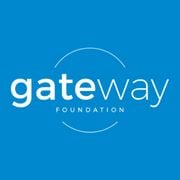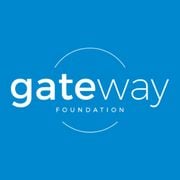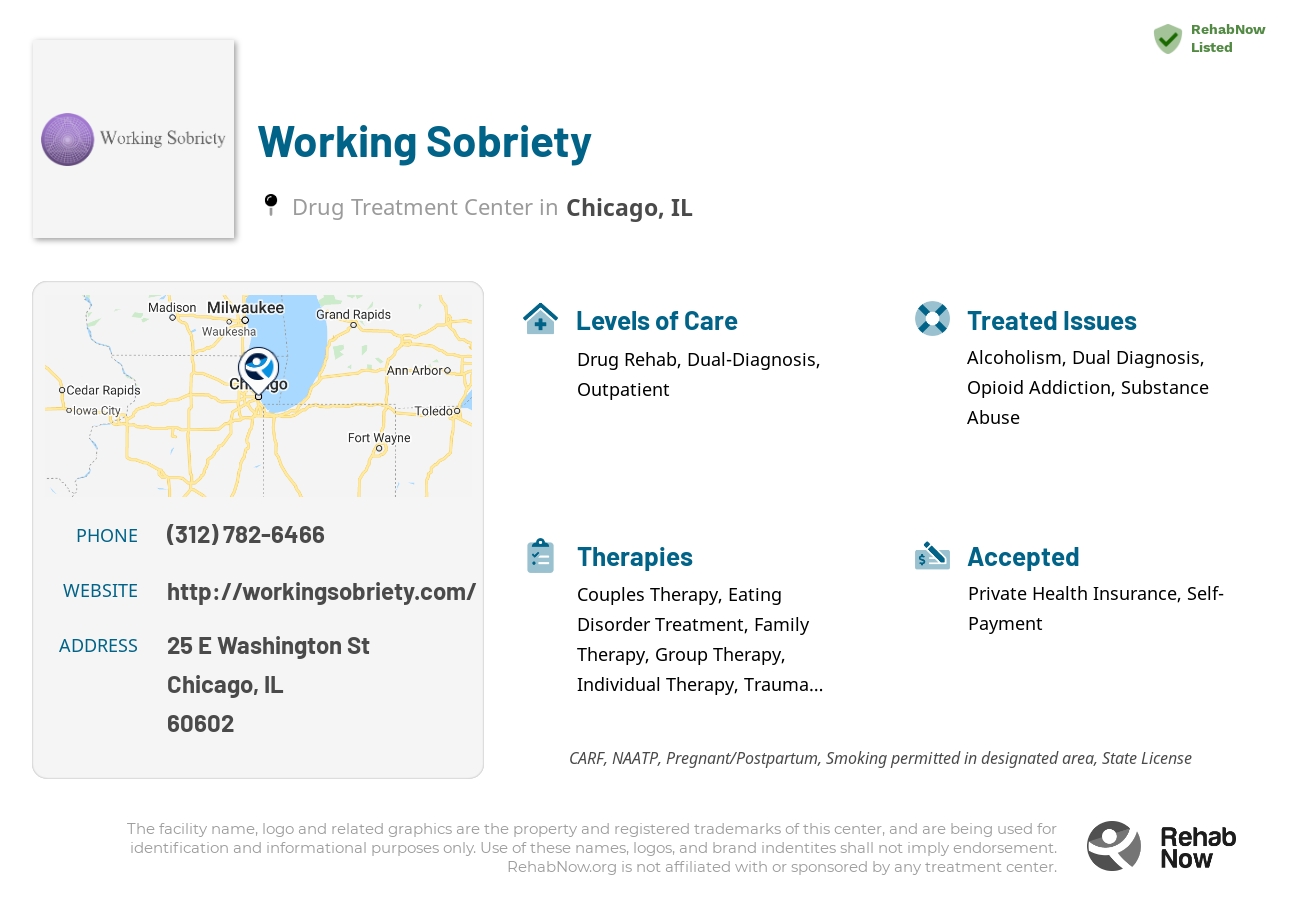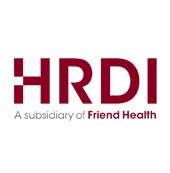
Working Sobriety
Drug Rehab Center in Chicago, Illinois
- Substance Abuse
- Opioid Addiction
- Eating Disorder
- Dual Diagnosis
- Drug Addiction
- Alcoholism
Working Sobriety in Chicago, Illinois is an outpatient facility that provides comprehensive substance use disorder and addiction treatment services, including group therapy, individual counseling, and medication-assisted treatment, with a focus on individualized plans and a variety of evidence-based, holistic, and spiritual approaches.
About This Chicago, IL Facility
Working Sobriety in Chicago, Illinois is an outpatient facility dedicated to providing comprehensive substance use disorder and addiction treatment services. With a combination of evidence-based, holistic, and spiritual approaches, their mission is to guide individuals to a sustainable sobriety through individualized plans that are developed to give hope and provide resources to those seeking recovery.
Working Sobriety offers a wide variety of services to assist individuals in both inpatient and outpatient settings. Treatment plans range from group therapy, individual counseling, medication-assisted treatment (MAT), relapse prevention, cognitive behavioral therapy, and family therapy. In addition, they provide trauma-informed treatment, life skills development, sober coaching, and intensive outpatient programming to assist clients on their path to recovery.
Working Sobriety takes pride in their accreditations and awards, offering clients the highest quality of care. They are a CARF-accredited facility, as well as certified by the Illinois Department of Human Services. They are also proud to be a recipient of the 2020 Joint Commission Top Performer on Key Quality Measures for Behavioral Health. Furthermore, Working Sobriety provides additional services such as in-home detox, wellness programs, peer support, and Grief Recovery Outreach.
Genders
Ages
Modality
Additional
Conditions and Issues Treated
Substance abuse refers to the intensive and inappropriate use of psychoactive substances. Psychoactive substances are those that affect brain function. These include illegal drugs, alcohol, and even the excessive use of prescription drugs. The overuse of psychoactive substances leads to severe physical or psychological dependence. It also affects the social life and relationships of the affected individual. Substance abuse is treatable.
The duration of treatment at Working Sobriety in Chicago can require weeks or even months depending on the severity of the condition as there is a risk of relapse. Treatment options include medications, counseling sessions, various types of behavioral therapy, and group therapy in different combinations.
Addiction to prescription opioid painkillers like oxycodone and hydrocodone, and illicit opioids such as heroin, leads to potentially life-threatening withdrawal symptoms when discontinued. Opioid addiction treatment typically involves an inpatient stay at facilities like Working Sobriety to make sure they get through withdrawal safely. Treatment also includes comprehensive mental health counseling.
Conditions such as anxiety, depression, schizophrenia, bipolar disorder are part of mental illness. This may occur that opioid abuse and vice versa are induced by mental illness. Diagnosing a concurrent diagnosis or co-occurring condition at Working Sobriety is essential to understand the addiction better.
Levels of Care Offered
This center offers a variety of custom treatment tailored to individual recovery. Currently available are Drug Rehab, Dual-Diagnosis, Outpatient, with additional therapies available as listed below.
Outpatient programs are the standard for addiction treatment. About 9 in 10 U.S. adolescents entering addiction treatment enroll in these programs, so you’re not alone in Chicago, IL. Treatment is delivered in different settings – offices, clinics, and primary care clinics.
Facilities offer a variety of services, such as individual and group counseling and family therapy. During the sessions, you work with a team of experts that include: General physicians, Psychiatrists, Social Workers, and Psychologists. The main goals of outpatient recovery programs are to help addicted individuals reduce drug use and addictive behaviors, eventually becoming entirely sober.
Working Sobriety‘s Therapies & Programs
In addiction recovery at Working Sobriety, therapy plays a significant role. This helps patients get to the root of their addiction and discover how the problems that contributed to their use can be handled better. Therapy can be performed in a group and one on one settings. The patient interacts with the therapist in a one-on-one atmosphere during individual therapy. This encourages them to reflect on the underlying addiction problems and develop ways to avoid potential future abuse.
Recovering from addiction involves recovering relationships as well. One of the most common areas of stress and damage during addiction is in intimate relationships. Couples therapy at Working Sobriety can rebuild trust and joy that may have been damaged. Addiction involves everyone in the family, not only the addict.
Family roles can change in damaging ways that may require professional help to rebalance. Successful intimate relationships can decrease the chances for relapse by ensuring a healthy environment after rehab in Chicago, IL.
Addiction and alcoholism affect the entire family. For this reason, family therapy is vital to a person’s recovery from addiction. In contrast to couples counseling, family therapy at Working Sobriety may include siblings, children, parents, and other significant people in the recovering person’s life. Family support is one of the most important pillars of recovery.
Many people turn to drugs and alcohol as a way of processing trauma that has affected them in the past. Trauma can include abuse, neglect, the loss of a loved one and other unpleasant incidents. Trauma therapy at Working Sobriety helps patients process trauma. It gives them the tools to deal with it in a healthier manner.
Payment Options Accepted
For specific insurance or payment methods please contact us.
Is your insurance accepted?
Ask an expert, call (888) 674-0062
Additional Details
Specifics, location, and helpful extra information.
Chicago, Illinois 60602 Phone Number(312) 782-6466 Meta DetailsUpdated November 25, 2023
Staff Verified
Patient Reviews
There are no reviews yet. Be the first one to write one.
Chicago, Illinois Addiction Information
In 2016, more than 2,350 Illinoisans died from drug overdoses. More than 5,500 deaths annually occur in Illinois due to the abuse of alcohol and other drugs. 7.17% of Illinois residents reported using illicit drugs in the past month (2018). Substance abuse costs the state approximately $3.5 billion every year.
Drug misuse can lead to other serious health problems, including HIV/AIDS or hepatitis C infection and liver disease. Chicago's main drugs of abuse include heroin, cocaine, and methamphetamine. Field sobriety tests can be used to determine if someone is driving under the influence of drugs or alcohol. There are about 872 drug treatment centers in the city, and the number of people seeking help for addiction continues to rise.
Treatment in Nearby Cities
- Melrose Park, IL (11.9 mi.)
- Galesburg, IL (156.4 mi.)
- Eldorado, IL (284.7 mi.)
- Carol Stream, IL (26.2 mi.)
- Rushville, IL (195.8 mi.)
Centers near Working Sobriety



The facility name, logo and brand are the property and registered trademarks of Working Sobriety, and are being used for identification and informational purposes only. Use of these names, logos and brands shall not imply endorsement. RehabNow.org is not affiliated with or sponsored by Working Sobriety.


